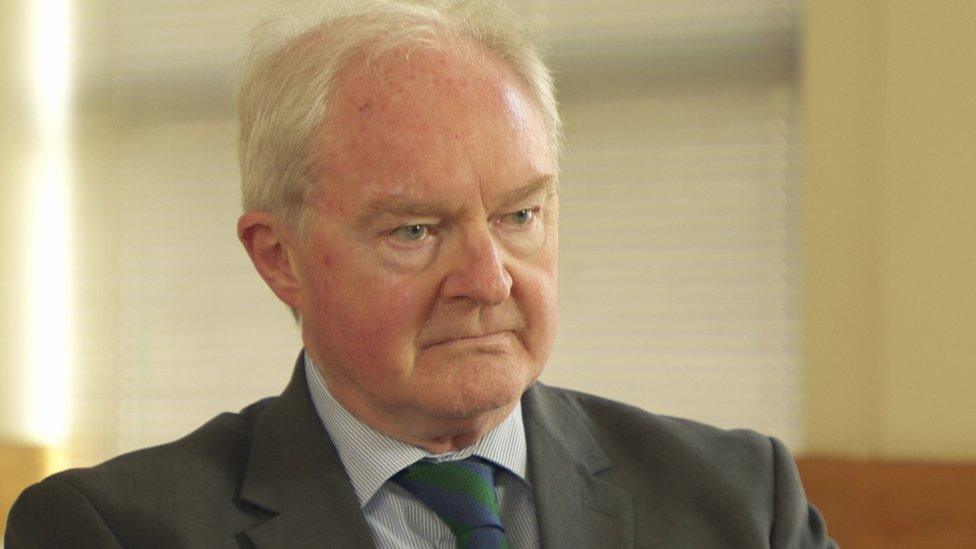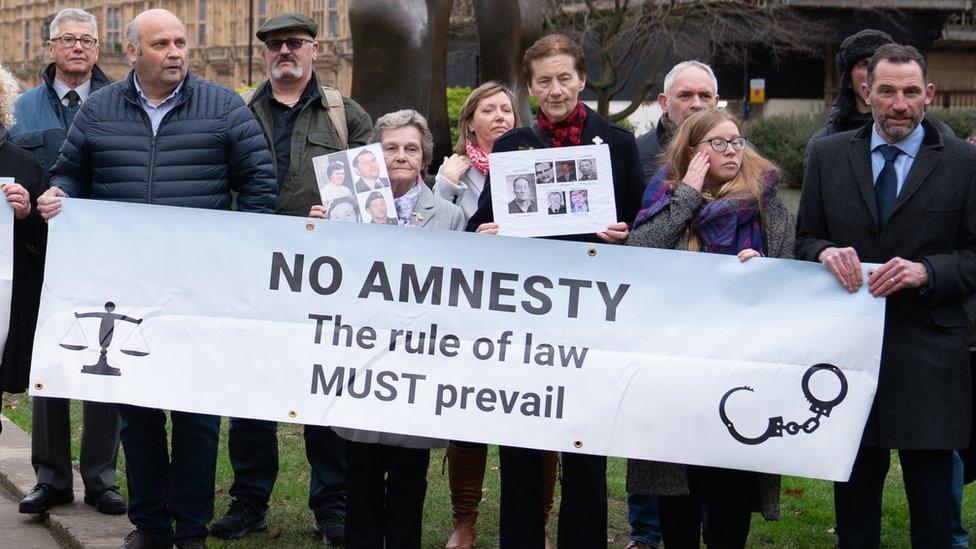Troubles legacy bill: MP in tears remembering murdered cousin
- Published
'Our pain is still raw and our people grieve'
A Northern Ireland MP broke down in tears in the House of Commons while speaking of the murder of his cousin and a friend in 1971.
Jim Shannon was speaking ahead of a key vote on the government's controversial Northern Ireland legacy bill.
It would end Troubles-era cases and inquests, and offer a conditional amnesty to those accused of killings.
The Democratic Unionist Party (DUP) MP said he could not see justice in the bill.
Mr Shannon's cousin, Kenneth Smyth, 28, an off-duty UDR soldier, and Daniel McCormick were both shot dead near Strabane, County Tyrone.
"Our pain is still here, our pain is still raw and our people grieve and my constituents grieve, and really you say they're going to have justice?
"We can't see justice, we don't see it."
MPs vote to reinstate amnesty
Northern Ireland Secretary Chris Heaton-Harris responded that the bill is not perfect but that families could use the bill to get information.
Earlier he said that the government believed it was "the best mechanism by which we can generate the greatest volume of information in the quickest possible time to pass onto families and victims".
The bill was being debated as it reached its third and final stage through Parliament.
At the end of the debate, MPs voted in favour - 292 to 200 - of reinstating the amnesty to those who cooperate with investigations under the new Independent Commission for Reconciliation and Information Recovery (ICRIR) body.
Last month, the House of Lords backed an amendment preventing a person from requesting immunity from prosecution as part of any future investigation.
It is now likely the government will fail in its bid to get the bill through Parliament before MPs begin their summer break on Thursday.
The amnesty is one of the most controversial aspects of the bill, which is opposed by all of Northern Ireland's political parties, the Irish government and groups representing bereaved families and victims.
The Social Democratic and Labour Party (SDLP) leader Colum Eastwood said the bill was "a license for impunity" and signalled that "you can murder your own citizens and get away with it".
"Mostly it's a piece of legislation that is written in very dark corners of the British establishment to ensure light is not shone into those corners," he added
Alliance Party MP Stephen Farry said the bill was "fundamentally flawed" and "not fit for purpose".
"Even at this 11th hour I think it's important we say they should withdraw this bill, it's not wanted and it's not going to work," he added.
Shadow Northern Ireland secretary Peter Kyle said there was still time for the government to pause and reconsider the bill.
"To pass this bill with immunity would be to fly in the face of everything we know about progress in Northern Ireland, it should not happen," he said.
The Commissioner for Victims and Survivors, Ian Jeffers, told BBC Radio 4's The World Tonight programme that the bill "does not solve the problems of legacy in the past here" with many fearing that any "slim chance" of justice would be removed by the amnesty.
He also said he hoped the delay would allow time for all to reflect on a "smarter" and "better" way to deal with legacy issues in Northern Ireland.
Mr Jeffers said the bill was now in a state of "ping pong" between the two houses of parliament, adding: "The one thing that the secretary of state and I agree on is we do need to find a solution."

What is the legacy bill?
Legislation that aims to draw a line under the Northern Ireland Troubles by dealing with so-called legacy issues
The Northern Ireland Troubles (Legacy and Reconciliation) Bill runs to almost 100 pages
It was introduced last May 2022 in an attempt to deal with more than 1,000 unsolved killings
A central element involves immunity from prosecution for those who co-operate with investigations run by a new information recovery body
Victims' groups, the Irish government and political parties at Stormont are opposed to the bill, arguing it will remove access to justice for victims and their families
Veterans Commissioner Danny Kinahan gave the bill a cautious welcome and it is also supported by the Northern Ireland Veterans Movement
The bill had its second reading in the Lords on 23 November. The government told peers it would bring forward amendments including "a more robust process" around immunity from prosecution
Lord Caine of the Northern Ireland Office said the ICRIR would be able to conduct criminal investigations and to expect more amendments to the bill
In June an amendment was introduced that would delay changes for a year to "ensure a smooth transition" to new arrangements
Another amendment stated any investigation run by the ICRIR must comply with obligations under the Human Rights Act 1998
- Published18 July 2023

- Published12 June 2023

- Published8 June 2023
